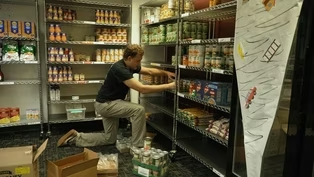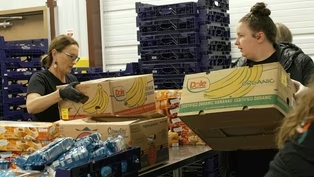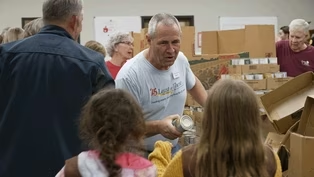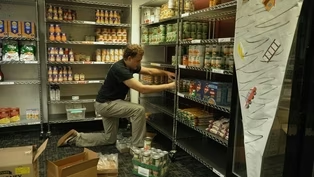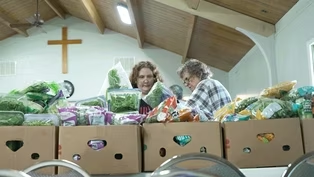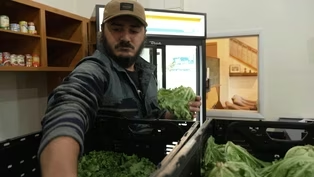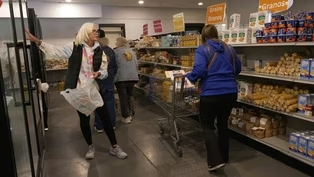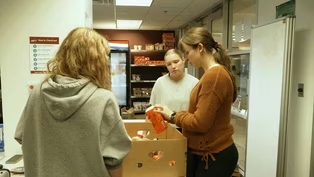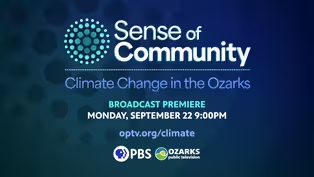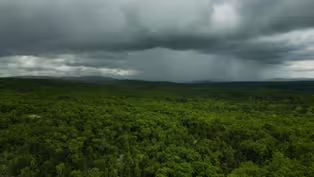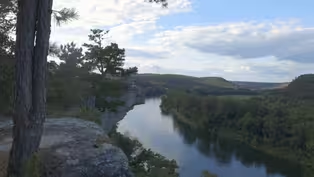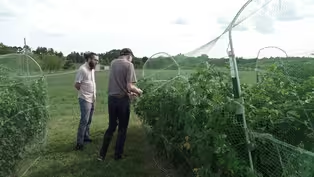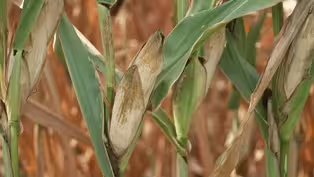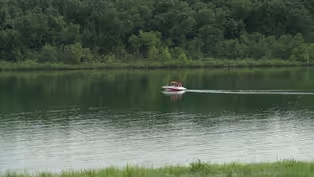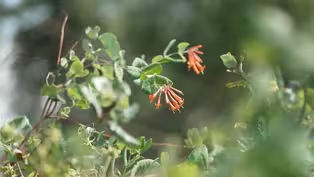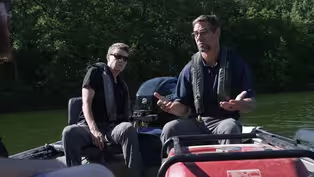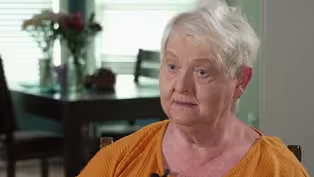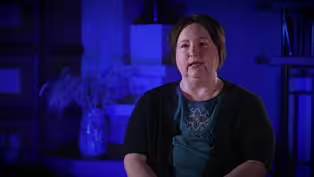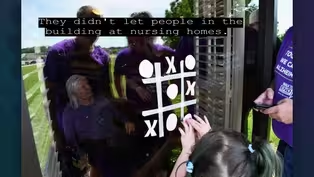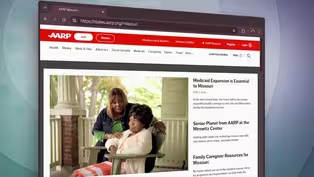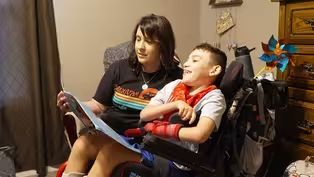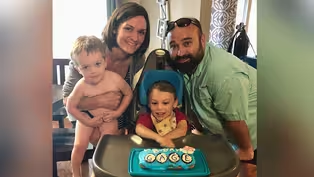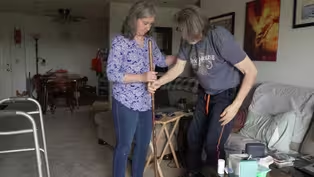Sense of Community
Growing Challenges
Clip | 3m 48sVideo has Closed Captions
A local farmer describes the challenges of growing crops in a changing Ozarks climate.
The changing climate creates a host of challenges for Ozarks agriculture. Local farmer, James Tucker, describes the ongoing obstacles he faces when trying to grow crops in increasingly extreme weather patterns.
Problems playing video? | Closed Captioning Feedback
Problems playing video? | Closed Captioning Feedback
Sense of Community is a local public television program presented by OPT
Sense of Community
Growing Challenges
Clip | 3m 48sVideo has Closed Captions
The changing climate creates a host of challenges for Ozarks agriculture. Local farmer, James Tucker, describes the ongoing obstacles he faces when trying to grow crops in increasingly extreme weather patterns.
Problems playing video? | Closed Captioning Feedback
How to Watch Sense of Community
Sense of Community is available to stream on pbs.org and the free PBS App, available on iPhone, Apple TV, Android TV, Android smartphones, Amazon Fire TV, Amazon Fire Tablet, Roku, Samsung Smart TV, and Vizio.
[AUDIO LOGO] My name is James Tucker.
I'm a sixth generation farmer from Willard, Missouri.
We raise corn and soybeans and wheat and put up some hay and run some beef cattle as well on our farm.
2025, in particular, has been probably the most dramatic, difficult time to raise crops in Southwest Missouri that I've experienced in my relatively young farming career.
What we're seeing generally, I would say, is longer periods of rain, longer periods of dry, longer periods of heat.
And it seems like what we're really having is an imbalance in the weather patterns, which is making it much more difficult to get in the field in a timely manner, to plant, to cultivate, to spray, to harvest, different things like that.
Climate change seems like it's making a bigger difference than it ever has before.
What we end up having later on in the year when the crops are maturing and filling is we have periods like we're having right now, which is extreme heat and longer periods of drought.
So you really need to get in early to try to get-- take advantage of those spring rains.
Then when you get all this moisture in April, you're delayed, and you have to get the crops out later.
And it just becomes more and more challenging to raise a good crop.
JACQUELYN WRAY: So the biggest things that affect agriculture right now are the extreme weather events that we have.
So there's more drought stress, more heat stress.
And more damaging is those late season freeze events.
And all of our plants are already coming out of their dormancy at that point.
So whenever that hits, it kills off a good portion.
JAMES TUCKER: These more extreme weather patterns we seem to get locked into.
Like once we get locked into one, it seems like it's harder to get out of it, and we can't seem to get, like, a nice balance of rain and sunshine and moderate temperatures.
It has definitely impacted our bottom line, because we've had these drought snaps late in the summer where we're trying to fill a soybean crop, or trying to fill a corn crop, or trying to plant corn in the spring and we can't get in the field because it's so wet.
A lot of people think like, you can't have too much rain, but it's not true.
[CHUCKLES] There's-- there's kind of an old saying in farming that is, farmers spend half the time wishing it would rain, and the other half wishing it would stop raining, which is really true.
We're trying to stay on the edge of the-- the latest hybrids that have been bred, with climate change in mind, that are going to be more resilient during longer periods of dry and heat and the same thing with longer periods of wetness.
For the last two or three years, it's been really tough to raise a good soybean crop, which has been historically about like half of what we grow.
When you have a very limited window of opportunity and you have periods of rain and rain and rain for weeks at a time, you're going to have more problems with weeds.
You're going to have fertilizer leaching out of the soil.
And it's ultimately going to become more expensive to-- to grow a good crop.
It takes a while for farmers to get on board with climate change largely because it becomes such a politicized issue.
It's hard to deny reality.
You know, you talk about the record rainfall we had this spring and-- and the dry we're having now, it becomes so evident to people.
And the reality is farmers know what's going on with the weather just about better than anybody, and they're going to be able to see the patterns that are developing.
I've long kind of accepted that this is something we're going to have to deal with and that climate change is a reality.
I'm kind of like losing hope that something is really going to be done in the near future to alleviate the problem, let alone solve the problem.
And it's going to be more like, how do you adapt to survive these dramatic swings in the weather?
Preview | 30s | Ozarks nonprofits strive to make sure no one goes hungry (30s)
Video has Closed Captions
Clip | 2m 15s | Ozarks Food Harvest partners with another local nonprofit to provide fresh produce for those in need (2m 15s)
Video has Closed Captions
Clip | 2m 30s | Joplin area residents come together each week to help a local nonprofit feed their community (2m 30s)
Video has Closed Captions
Clip | 2m 10s | A food pantry in Ozark provides, food, education and resources to those in need (2m 10s)
Video has Closed Captions
Clip | 2m 30s | Families in the Ozarks face difficult choices between buying food and paying rent (2m 30s)
Video has Closed Captions
Clip | 2m | Volunteers make sure unused crops get to those facing hunger (2m)
Video has Closed Captions
Clip | 2m | Community fridges across Springfield are helping to feed those who would otherwise go hungry (2m)
Video has Closed Captions
Clip | 2m 20s | Christian Action Ministries works to fill a need in Stone and Taney Counties (2m 20s)
Video has Closed Captions
Clip | 2m 20s | The Bear Pantry challenges conceptions of what food insecurity looks like (2m 20s)
Video has Closed Captions
Clip | 20s | Climate Change in the Ozarks - Broadcast Premiere Sept, 22 at 9pm (20s)
Video has Closed Captions
Clip | 5m 30s | Experts weigh in on the impacts of climate change on the Ozarks and suggest possible solutions. (5m 30s)
Video has Closed Captions
Clip | 5m 45s | Climate change creates greater rainfall in the Ozarks, negatively impacting our rivers. (5m 45s)
Video has Closed Captions
Clip | 3m 10s | Ozarks researchers work diligently to provide solutions to agricultural challenges (3m 10s)
Video has Closed Captions
Clip | 3m 48s | A local farmer describes the challenges of growing crops in a changing Ozarks climate. (3m 48s)
Video has Closed Captions
Clip | 3m 50s | As a growing population in the Ozarks consumes more water, the need for new sources arises. (3m 50s)
Video has Closed Captions
Clip | 3m 2s | Native plants serve as a unique solution to the obstacles faced by Ozarks wildlife and habitat. (3m 2s)
Video has Closed Captions
Clip | 3m 51s | Floating wetlands present a unique solution to the problem of algal blooms in the Ozarks. (3m 51s)
Video has Closed Captions
Clip | 1m 45s | Young caregivers, often driven by gender norms, face challenges but grow personally (1m 45s)
Awareness Rising: The Future of Caregiving
Video has Closed Captions
Clip | 1m 58s | Experts stress caregiving awareness; hospice care users share how it deepened their bond (1m 58s)
Video has Closed Captions
Clip | 2m | Caregivers reflect on emotional toll, stress rest, reflection, and daily joy to reframe caregiving (2m)
Video has Closed Captions
Clip | 1m 58s | COVID isolation impacted personal connection's role in health and happiness (1m 58s)
Tackling Missouri’s Dementia Crisis
Video has Closed Captions
Clip | 1m 50s | 130,000 Missourians have dementia; 250,000 unpaid caregivers face isolation, service gaps. (1m 50s)
Redefining Care: Finding Support and Recognition
Video has Closed Captions
Clip | 1m 50s | Caring for a disabled child brings emotional, financial hurdles; need for better access to support (1m 50s)
Video has Closed Captions
Clip | 1m 58s | Caregivers share emotional struggles while experts suggest therapy, and peer support for stress. (1m 58s)
Video has Closed Captions
Clip | 1m 50s | Caregivers often experience depression, fatigue, and medical crises, and emotional strain (1m 50s)
Providing Support for PBS.org
Learn Moreabout PBS online sponsorship
- News and Public Affairs

Top journalists deliver compelling original analysis of the hour's headlines.

- News and Public Affairs

FRONTLINE is investigative journalism that questions, explains and changes our world.












Support for PBS provided by:
Sense of Community is a local public television program presented by OPT
